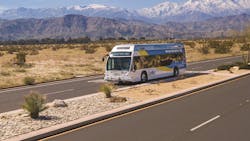SunLine’s fleet will be emission free by 2035
SunLine Transit Agency’s fleet of vehicles will be completely emission free by 2035 following approval of its Zero-Emissions Bus Rollout Plan by SunLine Transit’s Board of Directors on June 24.
“SunLine Transit Agency wanted to ensure that we submitted our plan early to allow for other small to mid-size systems to have a model to follow. It also positions SunLine to be first in line for any grants or funding programs that expand our zero-emission program,” said SunLine Transit Agency CEO/General Manager Lauren Skiver. “Our agency has a reputation for taking on a number of ‘firsts’ in the industry, and it is an honor to be a part of the progress made for clean air and alternative fuel technology.”
Back in 2000, SunLine Transit began a 13-month demonstration program using the first Buy-America compliant fuel cell bus to be placed in U.S. service. Since then, the agency has added 15 hydrogen electric fuel-cell buses and four battery-electric buses to its fleet.
The agency has also completed construction of a hydrogen electrolyzer in 2019, which has created infrastructure that promotes low- and zero-emission technology for the region and sets SunLine up well to establish a fleet that is entirely zero emission. The electrolyzer can produce 900 kg-H2/day, which is enough to satisfy demand for 32 buses.
SunLine says its completion of its hydrogen electrolyzer is an important step not only for the Coachella Valley, but also for fuel cell vehicle adoption across the country.
“SunLine’s innovative step positions the agency as a forerunner, leading the way to zero-emission solutions,” said the agency.
The board-approved rollout plan calls for all new fixed-route vehicle purchases to be zero-emission buses starting in 2021. The last compressed natural gas (CNG) buses purchased will be when the fleet has fully transitioned to zero-emission as each bus will operate for its entire 12-14-year useful life. SunLine Transit’s CNG paratransit vehicles will be phased out of the fleet by 2030.
The final fleet composition – 67 fixed route fuel-cell buses, 18 fixed route battery-electric buses and 39 paratransit fuel-cell vehicles – was determined to maximize performance and minimize cost.
The California Air Resource Board’s (CARB) Innovative Clean Transit Regulation was passed in December 2018 and requires all public transit agencies transition to a zero-emission fleet by 2040. Part of the mandate is a board-approved rollout plan that describes how an agency will transition to a zero-emission fleet.
SunLine Transit had until 2023 to submit a rollout plan to CARB, but the agency says its submission of the rollout plan is a first for a small-sized agency in the state.
About the Author

Mischa Wanek-Libman
Group Editorial Director
Mischa Wanek-Libman is director of communications with Transdev North America. She has more than 20 years of experience working in the transportation industry covering construction projects, engineering challenges, transit and rail operations and best practices.
Wanek-Libman has held top editorial positions at freight rail and public transportation business-to-business publications including as editor-in-chief and editorial director of Mass Transit from 2018-2024. She has been recognized for editorial excellence through her individual work, as well as for collaborative content.
She is an active member of the American Public Transportation Association's Marketing and Communications Committee and served 14 years as a Board Observer on the National Railroad Construction and Maintenance Association (NRC) Board of Directors.
She is a graduate of Drake University in Des Moines, Iowa, where she earned a Bachelor of Arts degree in Journalism and Mass Communication.
